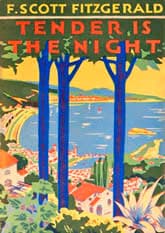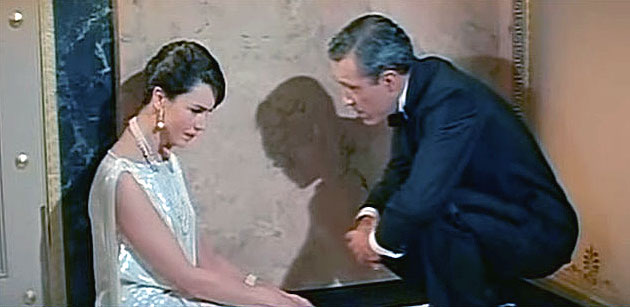Tender Is the Night
Critique • Quotes • At the movies
 First edition
First editionFirst publication
1934
Literature form
Novel
Genre
Literary
Writing language
English
Author's country
United States
Length
Approx. 119,500 words

The Divers (Jennifer Jones, Jason Robards) deal with mental breakdowns in Tender Is the Night.
Breaking down a Fitzgerald masterwork
Tender Is the Night (1962): Film, 132–142 minutes; director Henry King; writer Ivan Moffat; featuring Jennifer Jones, Jason Robards, Tom Ewing, Joan Fontaine, Jill St. John
The movies screwed up poor Scott Fitzgerald in more ways than one. His novels generally translated poorly to the silver screen. Plus, his attempts to write for the movies directly pretty well flopped, perhaps ruining what was left of his talent by that time in his life. His last great literary works were cynical stories of a screenwriter's experiences and an unfinished novel about Hollywood.
Tender is the Night, based on one of his two greatest novels, was not made until three decades after the book's publication and two decades after the author's death. And the result was a work much different from Fitzgerald's novel. It was a critical and popular flop at the time—although it's come up in critics' estimation somewhat since then.
Much was made at the time of Jennifer Jones's age. Rather than Nicole being the beautiful young patient of psychiatrist Dick Diver (Jason Robards), she appears close to the doctor's age. Actually Jones was older than Robards, in her forties, although she does appear younger than that. But this is not important to the story.
What is more important to the story is that the time period seems to be all askew. It's hard to tell this is supposed to be the 1920s, which Fitzgerald had a gift for depicting. The music, the fashions, the cars, the way people talk and act in this film—it's all mixed up, spanning the twenties through to the fifties.
And, although we're told over and over again "Look, we're on the French Riviera, now we're in the Alps...." as the expatriate Divers roam around on an endless vacation (no one has to work, it seems), we never get a sense of the crazy, over-the-top lifestyle that Fitzgerald put under his critical microscope. Yes, we get a couple of carefully crafted, supposedly madcap scenes at dinner parties and in a bar, but they seem drained of any real zaniness.
All the Fitzgerald touches are missing: the eye for telling detail, the quirky unbelievable little things that happen in real life, the lively bantering dialogue—even such major events as a murder and a scandal. What is left is mainly melodrama. As a novel Tender Is the Night has little overarching drama but is saved by brilliant writing. As a movie, without that writing, it's an unremarkable man-gets-woman, man-loses-woman story, stretched out to more than two hours.
Trailer for a belated melodramatic take on Tender Is the Night.
Don't get me wrong. Jones and Robards, along with a supporting cast that includes Joan Fontaine and Tom Ewell, terrific actors all, provide some very good moments with the material they are given. Early on—right around the time it becomes apparent that all is not well in the Diver family, that Nicole has inner demons—viewers may get the pleasant feeling they are in for a great emotional ride. But then very little else transpires that could not be predicted at that point. The novel kept us too preoccupied to notice, but the film drags us through every inevitable turn without redeeming distraction.
This is somewhat surprising, since the hand at the helm is the reliable Henry King, who had critical and popular success directing such films as Beloved Infidel (1959), a biopic of Fitzgerald's last years, and Hemingway adaptations The Snows of Kilimanjaro (1952) and The Sun Also Rises (1957). But Tender was his last film and perhaps he was losing his touch.
At the time of writing, this 1962 film version of Tender Is the Night seems not to be available in North America in any consumer-friendly format. Only in Europe. Which is appropriate somehow.
— Eric

